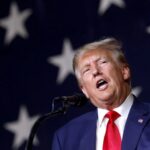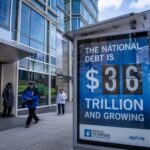By Jacob Burg
Vice President JD Vance visited northeast Pennsylvania on July 16 to make the Trump administration’s first big pitch to voters on President Donald Trump’s tax cuts and budget legislation, the One Big Beautiful Bill Act.
Vance, who cast the tiebreaking vote in the Senate to send the bill to Trump’s desk on Independence Day, touted the legislation’s tax breaks and funding for energy production and a children’s savings program. He also cast Democrats as enemies of tax breaks—and thus of the working class—because none supported the legislation in Congress.
Democrats have criticized the legislation for its funding cuts and changes to Medicaid and the Supplemental Nutrition Assistance Program, also known as food stamps, and will likely use it as ammunition against Republicans next year in closely contested congressional races. One of those contests will likely occur in the same region of Pennsylvania that Vance visited on July 16.
“We worked so hard to get this legislation passed to cut your taxes, to prevent big tax increases, to make it easier to save and invest right here in this great country that all of us love,” Vance said while speaking at a machine shop in West Pittston, Pennsylvania.
The vice president also touted the legislation’s new tax deductions for overtime.
“Now, thanks to President Trump’s leadership, if you work overtime, the federal government is not going to take a dime of that overtime,” Vance said. “You earn that money, you ought to keep it in your pocket.”
The legislation created a new children’s savings program, called Trump Accounts, for babies born in the next four years, which could offer a $1,000 deposit from the Treasury Department and essentially function as a tax-deferred investment account in which parents can contribute up to $5,000 per year per child.
Once a child reaches 18, the money can be withdrawn to be used for a down payment on a house, for education, or to start a small business. But if it’s used for something else, it will be taxed at a higher rate.
Vance said the initial $1,000 could “compound and build something” over 18 years of accrued interest.
“When they are ready to start off on a new life … when they’re ready to start a small business or to go into higher education, they’ve actually got real wealth built right here in the United States of America,” he said. “And that’s thanks to the One Big Beautiful Bill.”
The vice president addressed the Pennsylvanians in the crowd by highlighting their state’s status as an energy producer and the bill’s promotion of new oil and gas leases.
“We can produce energy more cheaply in the United States of America than anywhere else in the world,” he said.
Vance also urged the crowd, hailing from a critical swing district, to “talk about what the bill does for American citizens” because “we don’t want to wake up in a year and a half and give the Democrats power back” in Congress.
Trump signed the historic legislation into law on July 4 after it received almost unanimous support from Republican lawmakers. The bill includes key campaign promises such as extended tax cuts and the elimination of taxes on tips but also added new work requirements and funding cuts to Medicaid and food stamps.
Public opinion has been mixed. In a poll released on July 15 by CNN/SSRS, 61 percent of respondents said they oppose the legislation. Regarding its economic impact, 51 percent said it would hurt the economy, while 29 percent said it would help the economy.
As for whether respondents feel the legislation makes their families better or worse off, 37 percent said “worse off,” 16 percent said “better off,” and 29 percent said “about the same.”
Respondents were also split on key portions of the legislation, with the changes to tax laws, including no tax on tips, resulting in 54 percent saying the revamp was a reason to support the bill.
However, 47 percent said the legislation’s changes to the Social Security, Medicaid, and food stamps programs were reasons to oppose the bill.
Fifty-eight percent said the amount of money the legislation adds to the deficit is a reason to oppose it.






